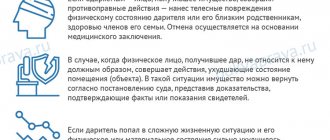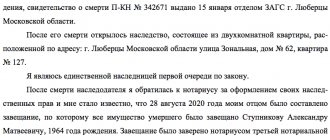Possibility to challenge the donation provided for by the legislation of the Russian Federation. Challenging such a transaction is a rather complicated procedure and has its own characteristics. During it the following must be taken into account:
- the donation can be challenged by filing a claim with the court;
- a limitation period has been established for challenging; depending on the circumstances, the period of such period ranges from 1 year to 3 years (Article 181 of the Civil Code of the Russian Federation) (Civil Code of the Russian Federation);
- It is necessary to have grounds for challenging, as well as evidence confirming such grounds.
An appeal to the court to challenge the donation is justified only in cases where the norms of the law have actually been significantly violated . Otherwise, litigation only leads to financial costs and loss of time.
Grounds for challenging a gift agreement
The grounds for challenging a donation must be substantial . Not always interested parties who believe that their interests are violated by such a transaction have the rights or grounds to challenge it. A donation can be challenged in cases where:
- the terms or subject of the transaction have been violated (for example, the contract specifies a condition on the transfer of the item as a gift only after the death of the donor - clause 3 of Article 572 of the Civil Code of the Russian Federation);
- the form and procedure for concluding a transaction are not observed (for example, the transfer of real estate is not registered in accordance with the law - clause 3 of Article 574 of the Civil Code of the Russian Federation);
- the donor does not have the right to donate this item (for example, according to the law, donating on behalf of minors is prohibited - clause 1 of Article 575 of the Civil Code of the Russian Federation);
- the donee does not have the right to accept a gift (legislation limits the possibility of accepting gifts by persons who are state and municipal employees, etc. - clause 2 of Article 575 of the Civil Code of the Russian Federation);
- donation is a feigned or imaginary transaction (usually such transactions are concluded in order to cover up another transaction - Article 170 of the Civil Code of the Russian Federation);
- misleading the donor about the substance of the transaction (the donor does not understand what consequences may occur for him);
- the transaction was made by an incapacitated person or a person who was insane at the time of entering into the transaction, etc. (if there is appropriate evidence - Article 171 of the Civil Code of the Russian Federation);
- the transaction was not carried out by a person voluntarily (for example, under threat, coercion or other circumstances);
- after the conclusion of the transaction, the donee made an attempt on the life and health of both the donor himself and the family or relatives of the donor (Article 1, Article 578 of the Civil Code of the Russian Federation);
- in case of bankruptcy or impending bankruptcy of the donor (clause 3 of Article 578 of the Civil Code of the Russian Federation);
- the donee treats the gift unworthily (if the actions of the donee can lead to the loss of the gift or create such a threat - clause 2 of Article 578 of the Civil Code of the Russian Federation);
- the donor survived the donee (and such a condition was indicated in the contract - clause 4 of Article 578 of the Civil Code of the Russian Federation);
- there is no consent of the donor's spouse to carry out the transaction.
If there are grounds, you can try to challenge the donation, but you must provide evidence . But even the presence of grounds and evidence does not always guarantee victory in court.
How to challenge a deed of gift if the donor has died?
This can be done by his heirs after taking ownership and after confirming a violation of the law or documentation rules. Most often, heirs are interested in how to challenge a deed of gift for an apartment precisely after the death of the former copyright holder. In legal practice, this is the most common type of civil dispute proceedings.
It is also worth noting that an oral transaction of a gift agreement is not allowed under any circumstances. Also, such an agreement does not allow the right of the donor to live indefinitely in the donated premises, since this transaction automatically ceases to be gratuitous. However, the contract can provide for the case when the donor outlives the donee due to age, in which case the donated property can be returned to the donor.
The following may be included as evidence:
- witness statements;
- extracts from the real estate register;
- medical evidence.
ATTENTION: watch the video and subscribe to the YouTube channel of our Law Office, in the comments to the videos you can ask your question to a lawyer for free and receive a professional answer on time:
Statement of claim to challenge the gift agreement
The statement of claim must be properly completed. The preparation of the application should be entrusted to a specialist (lawyer or attorney), since it is necessary in the text of the document to correctly state the position of the plaintiff , references to legislative and regulatory acts, and also to form an evidence base.
When writing a claim, the document must indicate :
- details of the parties to the dispute and their location or addresses;
- subject and essence of the dispute;
- reasons and evidence;
- list of attached documents;
- date and signature of the applicant (or his representative).
The application is submitted to the court in several copies (depending on the number of parties to the case). The court employee marks the acceptance of the application on one copy and gives it to the plaintiff.
Refusal to transfer a gift
If the donation document was drawn up correctly, it will be extremely difficult for even the donor himself to challenge the deed of gift in court. The question of whether a deed of gift is contested is most often asked to a lawyer.
To recognize an apartment donation agreement as invalid, the following conditions must be met:
- The recipient died before accepting the gift. Acceptance, expressed in writing or orally, is a confirmation of the recipient’s consent to the will of the donor, regardless of the period within which this consent was received.
- The donated object is not in proper condition. The apartment has been turned into a brothel, the car is broken, the garden is overgrown with weeds.
- There is a risk to the life and health of the donor. A transaction can only be contested if there is a real threat.
The death of the donor, which occurs as a result of the unlawful actions of the recipient, is a serious reason for depriving him of the right to dispose of the gift and raising the question of whether the gift agreement can be challenged in such a situation. To do this, the relatives of the deceased, who doubt that he died a natural death, must apply to the courts with a corresponding claim and go through the entire procedure, like challenging a deed of gift for a house or apartment.
Period for challenging a donation
To challenge a donation, the legislation (Article 181 of the Civil Code of the Russian Federation) establishes certain deadlines during which the plaintiff has the opportunity to submit a corresponding application to the court. Depending on the situations and circumstances, the terms for challenging may vary:
- statute of limitations is 3 years : on the application of the consequences of an invalid transaction or on the recognition of a transaction as invalid (the period begins from the day of execution of the contract or from the day when the plaintiff learned about the beginning of execution of such a transaction);
- statute of limitations is 1 year : on declaring a voidable transaction invalid or on applying the consequences of its invalidity (the period begins when the person was released from threats or other actions - if the donation was made under duress, etc., or from the day when the plaintiff learned about the circumstances, allowing the donation to be invalidated).
The limitation period may be increased at the request of the plaintiff , but if there are significant circumstances in which this period has been missed.
Remember
- The grounds for challenging a deed of gift during the life of the donor may be non-compliance with the requirements of the law on the form of the agreement, the completion of a transaction under the influence of threats, the incapacity of the donor and other circumstances provided for by the Civil Code of the Russian Federation.
- Legal proceedings can be initiated by the donor, donee, creditors, legal representatives of the donor, and in some cases, heirs.
- To challenge the gift agreement, the plaintiff must prepare evidence confirming the validity and legality of the stated claims.
- The time frame for challenging a deed of gift depends on the grounds that served as the reason for going to court, and is usually 3 years. To annul voidable transactions (made under the influence of threats, violence, etc.), plaintiffs have only 1 year.
- The limitation period begins to run from the moment the contract is executed or when the party learns that its right has been violated.
- If a court decision declares a gift agreement to be invalid, the other party is obliged to return the donated item, as well as pay compensation in case of damage or damage to the object of the donation.
Will you try to prove that the donor did not understand the significance of his actions at the time of execution of the deed of gift? Do you decide to challenge the gift agreement if more than seven years have passed since its conclusion?
Challenging a donation after the death of the donor
Situations arise when heirs find out that the testator, during his lifetime, donated his property to one of his relatives or to a complete stranger. In this case, the heirs are deprived of the right to such property. But sometimes it is possible to challenge donations on the grounds provided by law. However, there are certain features for challenging a donation:
- The statute of limitations in this case is 3 years ;
- the plaintiff did not know or should not have known about the transaction during the period when the donor was alive.
Otherwise, it is almost impossible to challenge such a transaction. In court, it will be necessary to prove not only the grounds, but also the ignorance of the plaintiff during the period of the donor’s life.
Is it possible to sue a deed of gift for an apartment, house, car or land during the life of the donor?
If any of the above grounds exist, you can sue for a deed of gift for a house, apartment, land, or car.
What violations may affect the validity of the apartment donation agreement?
Most often, a deed of gift for an apartment is disputed when:
- There is no notarized consent of the spouse to complete the transaction - if the apartment was acquired during marriage. The exception is cases when a marriage contract was concluded between the spouses. Under the terms of which the consent of the other spouse for transactions is not required.
- The consent of all owners was not obtained - if the donated apartment was jointly owned by several persons. For example, Vladimir and his brother inherited an apartment from their father. Vladimir issued a deed of gift for an apartment in the name of his friend without his brother’s consent. In this case, the brother has the right to challenge the deed of gift for the apartment during the life of the donor.
- A share in the apartment was not allocated - if this part was the subject of a donation agreement. Since the owner can only dispose of that share in the property that belongs to him.
- There is no consent of the creditor to conclude a transaction - when the property donated was pledged to a bank or other person.
The agreement under which a non-privatized apartment was donated may be challenged. Since the property does not belong to the donor and he, in turn, has no right to dispose of it.
There are often cases when an apartment donation agreement covers a purchase and sale transaction in order to avoid paying tax. Since personal income tax in the amount of 13% of the cadastral value of housing is not charged if the agreement is concluded between close relatives - Art. 217 Tax Code of the Russian Federation:
- Spouses.
- Parents and children, adoptive parents and adopted children.
- Grandfathers, grandmothers and grandchildren.
- Full and half brothers and sisters.
In this case, it is disputed as a sham transaction.
Is it possible to challenge a deed of gift for a house?
You can challenge a deed of gift for a house in the same cases as a deed of gift for an apartment.
In addition, a donation that provides for the alienation of a land plot without buildings and structures located on it violates the requirements of paragraph 4 of Art. 35 ZK KR. That in accordance with Art. 168 of the Civil Code of the Russian Federation entails the nullity of the concluded transaction.
Is it possible to challenge a deed of gift for a car?
You can challenge a deed of gift for a car on almost any of the above grounds. But if the deed of gift was oral in nature, then it will be more difficult to recognize it as invalid.
For example, the donor gave a car in words and at the same time ignores the recipient’s requests to be present at the registration authority and refuses to give consent to re-register the vehicle. And the recipient of the gift has already invested more than 100 thousand rubles in repairing the car. In order to challenge a transaction, you first need to prove the fact of its conclusion.
Is the deed of gift contested or not after the death of the donor?
Relatives of the donor are often interested in whether the deed of gift is disputed or not after his death. Successors or other persons can challenge the gift agreement on almost any of the above grounds. But only if there is appropriate evidence.
Naturally, the donor himself will no longer be able to do this. Also, he will not be able to cancel the donation under Art. 578 Civil Code of the Russian Federation.
See also:
Is it possible to challenge a deed of gift for an apartment after the death of the donor by children in 2021
Sample statement of claim for invalidating a transaction that violates the requirements of the law (DOC, 20 KB)
Challenging the donation of an apartment
Donating an apartment has its own characteristics, failure to comply with which may result in the loss of the right to the gift if such a transaction is contested. Thus, the transaction of donating an apartment can be challenged on the following grounds:
- the transfer of real estate has not passed state registration;
- incapacity of the donor at the time of execution of the transaction;
- prohibition of donation;
- the possibility of losing the apartment or the presence of such a threat due to the actions of the donee;
- an attempt by the donee on the life and health of the donor or the donor’s family or relatives of the donor;
- other reasons.
You can challenge not only the donation of an apartment, but also the donation of a share of the apartment. The grounds for this are similar to the grounds for challenging the donation of an apartment.
Example
Alexey filed a lawsuit against Dmitry (the defendant) to invalidate the donation of 3/11 shares of the apartment. In substantiating his claims, Alexey indicated that his father entered into a donation agreement with Dmitry, transferring to the latter 3/11 shares of the apartment as ownership. The plaintiff indicated that when making the transaction, his father did not understand the significance of his actions and long before the conclusion of the transaction he was registered in a psychological dispensary. The plaintiff provided evidence to the court about his father being registered and receiving treatment.
The defendant, Dmitry, objected to the claim and asked the court to refuse to satisfy the plaintiff’s demands, citing the fact that at the time of the transaction, the notary who recorded (certified) this transaction had to check the legal capacity of the persons making this transaction.
The court, guided by the legislation of the Russian Federation and taking into account the evidence provided by the parties, satisfied the demands of Alexey (the plaintiff) and declared the contract invalid.
What is a deed of gift and how to make sure it is drawn up correctly
A gift agreement (deed of gift) is a transaction under which the donor, free of charge, transfers or undertakes to transfer into ownership of the donee an item belonging to him, a property right, or release him from a debt - Art. 572 of the Civil Code of the Russian Federation.
A contract can only be concluded during the life of the donor. The condition of donation after death is void. The transaction is considered concluded from the moment the donor transfers the thing to the donee - Art. 224, 433, 574 Civil Code of the Russian Federation.
An important requirement for this transaction is that it is free of charge. When the text of the agreement contains provisions according to which the donee must give something to the donor in return, this indicates the absence of a gift.
The agreement can be concluded orally. Written form is required when - Art. 574 Civil Code of the Russian Federation:
- Real estate is given as a gift - in this case, state registration of the transaction is also required.
- The transaction contains a provision for a gift in the future.
- The donor is a legal entity, and the value of the gift is above 3 thousand rubles.
If the car donation agreement is concluded orally, then the personal presence of the donor will be required to re-register the vehicle as the property of the donee.
The deed of gift must contain essential and additional conditions. Essential conditions are those mandatory rules, in the absence of which the transaction may be declared invalid. Additional - included in the text at the request of the parties.
The essential (mandatory) conditions of the gift agreement also include a detailed description of the subject of the transaction - Art. 432 of the Civil Code of the Russian Federation. When an apartment, house or land is used as a gift, the following must be indicated:
- Characteristics - area, number of rooms, number of floors.
- Cadastral number.
- Property location address.
- Type of property right.
- Presence/absence of encumbrances.
And also the text must include:
- FULL NAME. or names of the parties.
- Passport details, TIN.
- Residence or registration address/legal address.
- Contact information.
As additional conditions in the contract, it is advisable to provide for the possibility of returning the item of donation. If the donee dies before the donor, in the absence of such a clause, returning the donated item will be problematic.
Is it necessary to notarize the deed of gift?
The legislation does not contain a requirement for mandatory notarization of a gift agreement. The parties to the transaction have the right to independently decide whether to contact a notary or not.
On the one hand, notarization entails additional financial costs. On the other hand, it can protect the parties from recognizing the gift agreement as invalid in some cases. Accordingly, it will be more difficult to challenge a transaction certified by a notary.
For example, the likelihood of canceling a notarized deed of gift due to the incapacity of the donor or as being made under duress is negligible. Since the notary checks the legal capacity of the parties to the transaction, and also makes sure that they act voluntarily and are aware of the consequences of their actions.
When filing a claim in court to invalidate such a transaction, you need to be prepared for the fact that a notary may appear in court. Where he will testify as to how the deal was concluded.
Important! If the donor has not contacted a notary to allocate a share in the property (when the subject of the donation is only a part of the property), such a transaction may be challenged.
Judicial practice of challenging donations
Judicial practice in cases of challenging gift agreements is not clear-cut. The courts are guided by current legislative norms, as well as the positions and explanations of higher courts. The main documents that courts use and rely on when making decisions in cases challenging gift transactions are:
- Civil Code of the Russian Federation;
- Determinations of the Presidium of the Supreme Court of the Russian Federation;
- Review of judicial practice in these cases.
However, the decisive factor influencing the decision made by the court is the evidence provided by the parties when challenging such transactions.
The procedure and period for challenging a deed of gift in court
It is necessary to take into account the procedure and period for challenging, which are strictly regulated and carried out according to the established scheme. It is also worth noting here that the deadlines for challenging apply to all types of contracts; the practice of challenging a loan agreement can also help you with this (more details at the link).
This practice of challenging a gift agreement has its own statute of limitations. For a transaction, the voidable period is one year , for a void transaction – three years . These periods are calculated from the date of preparation of the document. The circumstances when the person learned or should have learned about a violation of his rights are also taken into account.
If you have missed the deadline for appealing a document, you must restore it through a petition, attaching valid evidence of the omission, which may be:
- forced business trip;
- sick leave;
- other reasons why a person learned late about the violated rights.
Useful: watch the VIDEO on the issue of challenging a contract and challenging transactions with the help of a lawyer, write your question in the comments of the video right now
The order most often has the following algorithm of actions of the transaction party:
- negotiations for a peaceful solution to the conflict . It is possible that the party to the transaction will understand the expediency of terminating the contract, transferring the rights back to the donor without litigation, especially for persons who are close relatives and can amicably resolve the conflict without washing dirty linen in public;
- the claim in this category of cases does not apply, because in essence, donation between legal entities is an unacceptable phenomenon, which means that the mandatory claim procedure for resolving disputes provided for by arbitration procedural legislation does not need to be observed. Feel free to move on;
- statement to the police . If criminal actions are seen on the part of the donee, who forced him to sign an agreement or performed other fraudulent actions against the donor, then without initiating a criminal case it will be difficult to punish the culprit. Contact the police department at the place where the transaction was made with a written statement, you will be given a KUSP, which will confirm registration. Our lawyer will always help, both in drawing up an application to initiate a criminal case, and in appealing the refusal to initiate it on far-fetched grounds by police officers;
- statement of claim . Next, we file a lawsuit; it is impossible to challenge the deed of gift in court without a lawsuit.
Deadlines and documents
A deed of gift is an open-ended transaction. By placing any restrictions on the period of acceptance or use of a gift, the donor recognizes it as void. Until the registration of ownership of the donated housing, the donor can change the terms of the deed of gift by choosing a new recipient or canceling the document itself. As soon as the recipient registers the property in his or her name, the deed of gift is recognized as executed and not subject to rollback. His right to dispose of property can only be questioned by resorting to judicial intervention, as already mentioned above.
When the donor does not seek to deprive himself of property in the near future, he has the right to modify the agreement, turning it into a promise. In this case, the donor may list the conditions under which the recipient will receive ownership rights. In its direct interpretation, this document is not a deed of gift, but its preparation is still permissible. At the same time, the donor retains the right to change the terms of the transaction, cancel them, or choose another person whom he would like to gift in this way.
Example: Citizen Nagibis D.I. decided to give his 16-year-old son an apartment, setting the following conditions: the property is transferred for free use only after graduating from college and getting a job. Until this time, the donor will remain the official owner of the gift, but the recipient retains the right to use this living space for living.
Deadlines for going to court
To challenge a contract legally, you must follow the procedure for going to court. A statement of claim can be filed no later than 3 years after the recipient receives the gift. The period for challenging a gift agreement may be increased, but to do this, the plaintiff must prove that the plaintiff lacks information about the fact of the gift. If the applicant was abroad, in prison, or was sick, the period can be extended. If the donor has changed his mind about giving a gift to a specific person, but the document itself has already been presented and the gift has been accepted, then he can begin challenging the gift no later than 5 years after signing the document.
The deadline for going to court to challenge the donation of an apartment is 9 years. If the property has been in the possession of the new owner for 10 years or more, then the court will not consider the claim filed against him. Earlier than the specified deadline, such an attempt is still possible.
The transaction is declared illegal no later than 1 year after all the circumstances of the case are revealed. After the specified period has expired, it will not be easy to recognize the document as illegal.
When considering the timing of going to court, it is also logical to ask whether it is possible to challenge a deed of gift after the death of the donor, in what time frame such a claim will be considered, and whether it is possible to accept it for further challenging the deed of gift for an apartment. The answer to this question should be sought in the Civil Code of the Russian Federation, according to the provisions of which any citizen who has information about the illegality of the transaction can be a plaintiff in the case.
The procedure for invalidating an apartment donation agreement and judicial practice in these disputes
- Registration of a transaction with a donor who has not reached the legal age of 14 years.
- If the donor is declared incompetent, and the guardian did not give his consent to this transaction. The transaction was made under threat of physical harm.
- The agreement under which the apartment was donated will be declared invalid if, under its cover, a purchase and sale transaction was actually carried out.
- The presence in the gift agreement of certain conditions that the recipient needs to fulfill in favor of the donor will also serve as a reason for declaring this agreement invalid.
- Causing bodily harm to the donor or members of his family to the recipient, as well as if there is a threat to their life.
- A sharp decline in the standard of living of the person who donated the apartment, if termination of the transaction makes it possible to raise this level.
- Negligent attitude of the recipient towards the gift, with the risk of damage, destruction or irretrievable loss of the object of the gift.
- The sudden death of the donor, which seems suspicious to the relevant law enforcement departments.
On the nullity of a gift agreement in 2021
A deed of gift may be declared void if the following grounds exist:
- A sham gift agreement was concluded by the parties to replace transactions (for example, a gift deed is concluded instead of the purchase and sale of an apartment).
- An imaginary transaction of donating an apartment is concluded without the intention of creating legal consequences (quite often, a deed of gift for an apartment is drawn up if the donor is threatened with confiscation of property).
- The gift agreement was signed by an incapacitated person who has a mental illness.
- The property was donated for purposes that were initially aimed at violating morality and law and order.
- The gift was made in favor of the recipient by a person who was not yet 14 years old. At the same time, according to the current legislation of the Russian Federation, a child can act as the party receiving the gift if his legal representative gives his consent to the transaction.
- The donation was made in violation of the prohibition on the disposal of real estate or restrictions on the use of this apartment. Such transactions include some of the situations we described in the article on donating an apartment with a mortgage.
Also, it is worth noting the fact that the court can, on its own initiative, apply consequences of the nullity of a gift agreement in cases where this may be necessary for the actual protection of public interests.
Do relatives have the right to challenge the agreement?
It is not possible to challenge a gift agreement drawn up and executed in accordance with the law. For example, if a grandfather, for some merit or on his personal initiative, gave his house to a neighbor, and he continues to live in it, then nothing can be done in this case. Since the grandfather, if he is fully capable, has the right to dispose of his property at his personal discretion.
In order to return a donated house, compelling reasons are needed that the court considers sufficient to invalidate the transaction.
Persons who are relatives of the former owner have the right to challenge it in the following cases:
- if the owner was declared incompetent at the time of the transaction;
- if the donor was in an inadequate state (alcohol, drug intoxication);
- if pressure was exerted on him from outside.
According to Art. 168 of the Civil Code, a deed of gift may be challenged as violating the requirements of the law:
- The former owner did not have the right to dispose of the disputed real estate (for example, the property was in a dispute about the division of property between ex-spouses or there was a regulatory act declaring the purchase and sale agreement invalid, i.e. he did not have legal rights to the house).
- if the owner did not have official consent from the spouse to the transaction (if the property was jointly acquired).
- lack of consent to the transaction by one of the owners (if the house was in shared ownership).
Also, the donation can be challenged in accordance with Article 170 of the Civil Code (imaginary/feigned transaction). Thus, a deed of gift can be recognized as an imaginary or feigned transaction if its purpose was to hide property from paying taxes or it was a cover for another transaction:
- Imaginary - which in fact did not exist. For example, the donor has a valid writ of execution, according to which his property and funds are seized. And to avoid this, the donor enters into a deal with one of his friends or relatives, thereby fictitiously transferring his property into ownership, while he continues to live in this house.
- Feigned - which hides the true essence of the transaction. For example, the party to whom the gift is intended promised the donating party to pay utilities, provide financial assistance, or provide care for her. From which it follows that donation covers two other types of transactions - sale or rent.
A deed of gift can also be challenged in the case where the donor was legally capable, but was not aware of his actions (Article 177 of the Civil Code). So, for example, the presence of a disease (alcoholism), which affected the adequacy of the donor and caused temporary clouding of reason. In this case, the donor abused alcoholic beverages, but was not registered. That is, he was not declared incompetent by the court, but he did not control his actions. He could also have been deliberately drugged so that he would sign the deed of gift.
A deed of gift made under the influence of error is also subject to challenge. This means that the donor did not understand all the legal intricacies of the transaction. For example, a grandmother decided to give a house to her friend, but did not know that after this her grandchildren and children would no longer be able to use it (Article 178 of the Civil Code).
Other ways to cancel a contract
The rules for conducting a property transaction are described in detail in Chapter 9 of the Civil Code of the Russian Federation. It is necessary to compare the provisions of the articles of this document and the events that occurred at the time of registration of the alienation of property. According to Art. 166 of the Civil Code of the Russian Federation, a transaction may be declared invalid as a result of its being contested or declared void.
The following facts may be grounds for filing a claim in court:
- conducting a sham transaction, when a house is sold under the guise of a donation (Article 170 of the Civil Code of the Russian Federation);
- participation in the process of alienation of property of persons who suffer from certain mental illnesses (Article 171 of the Civil Code of the Russian Federation);
- signing of documents by a child under 14 years of age (Article 172 of the Civil Code of the Russian Federation);
- registration of the agreement by a subject of justice that is limited in such actions or does not have the appropriate license (Articles 173-174 of the Civil Code of the Russian Federation);
- participation in the process of signing official papers of a minor who is not recognized as legally capable (Article 175 of the Civil Code of the Russian Federation);
- if the deed of gift is signed by a person who, due to drug and alcohol abuse, is limited in legal capacity by a court decision (Article 176 of the Civil Code of the Russian Federation);
- the commission of property actions by a capable citizen who, at the time of signing the papers, was in a state where he did not realize what was happening (Article 177 of the Civil Code of the Russian Federation);
- signing documents under the influence of delusion, when the donor did not understand the true purpose, motives of the transaction and its consequences (Article 178 of the Civil Code of the Russian Federation);
- signing official papers for the alienation of real estate under the influence of threats, blackmail, deception or violence, when the donor found himself in a hopeless situation and signed an unfavorable agreement for himself (Article 179 of the Civil Code of the Russian Federation).
It should be remembered that the statute of limitations for a house transaction is three years from the date of its signing.
The question of whether it is possible to win a deed of gift for a house back can be resolved by carefully analyzing the available papers and collecting evidence that the plaintiff must collect and prove in court.
We recommend reading: Is a donated apartment divided during a divorce?
Legal support! Legal assistance WhatsApp +79169906144
A donation can be challenged if there are certain grounds provided for by law. In most cases, donation is challenged only in court. In this case, it is necessary: to have grounds for challenging the transaction (if there are no grounds, it is pointless to challenge the transaction, since the plaintiff’s wishes alone are not enough for the court to recognize the transaction as invalid or void).
Is it possible to challenge a deed of gift for a house?
To challenge the donation of real estate, the consent of both parties or termination of the contract by a court decision is required.
If the parties have no objections, then terminating the deed of gift will not be difficult. For this procedure, you need to write and sign a termination agreement and execute it.
If one party does not agree with the cancellation of the transaction, this issue will need to be resolved in court.
Grounds for prohibiting donation
There are several reasons for prohibiting the gratuitous transfer of ownership of a house. If a document contains prohibited clauses, it automatically becomes incorrect and has no legal force. The provisions include:
- donation on behalf of a minor;
- from an incapacitated person and legal representatives;
- registration of a gift for an employee of a medical or educational institution;
- the donation will not be recognized if the person was treated or raised by the donee;
- also, a gratuitous transfer cannot be issued for people working in the social sphere on behalf of a ward;
- transfer to a citizen holding a municipal or government position (this action may be regarded as a bribe);
- It is prohibited to formalize a donation in favor of an employee of the Central Bank of the Russian Federation to receive benefits.







